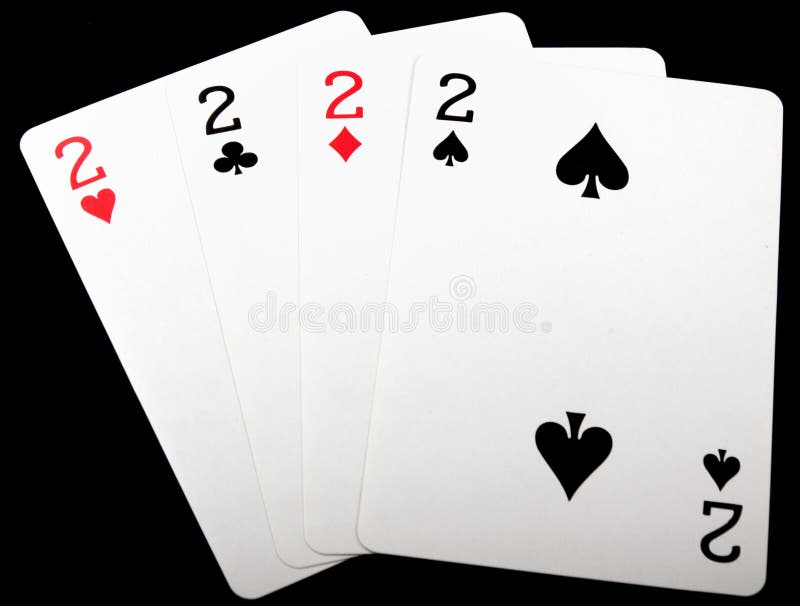
How to Play Deuces Wild Video Poker. Like most other video poker games, bets are placed at the start of the hand, and each player is then dealt five poker cards.Similarly, players can hold all five of the cards or choose to replace any or all of the cards, with the goal of ending up with a better — and ideally winning — hand. The first person to make three pairs starting from a five card hand is the winner. Most hands take only a few minutes to play, and oftentimes less than that. Anyone can squeeze a game of Pitty Pat.
The great news is that MSN Games (Zone) offers over 100 games that are developed using HTML5 that will function well into the future. Where possible a direct HTML5 version of the game you know, and love will be available as a replacement. We don’t want you to miss any of the fun so please try some of our newer games today!
The Deuce (German: Daus, plural: Däuser) is the playing card with the highest value in German card games. It may have derived its name from dice games in which the face of the die with two pips is also called a Daus in German.[1]
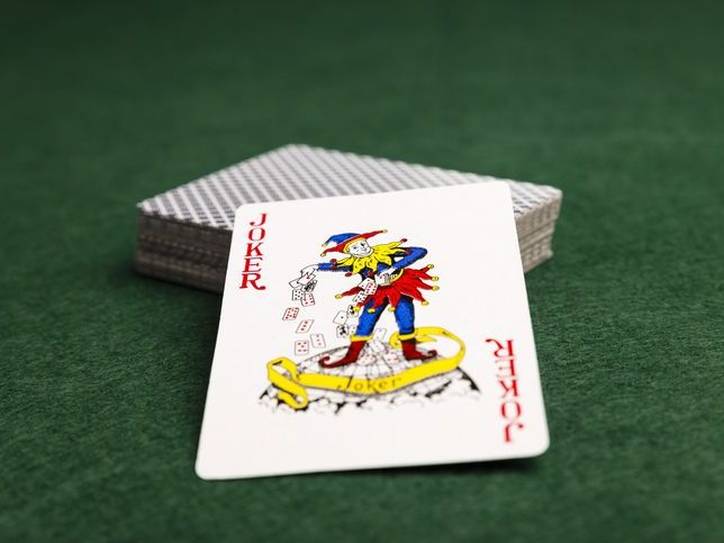
Unlike the Ace, with which it may be confused, the Deuce represents the 2, which is why two hearts, bells, etc. are depicted on the card. In many regions it is not only equated to the Ace, but is also, incorrectly, called an Ace. In the south German area it has been historically called the Sow (Sau) and still is today,[1] because of the appearance of a wild boar on the Deuces in early card packs, a custom that has survived on the Deuce of Bells.
Ei der Daus! (also: Was der Daus!) is an expression, similar, to 'What the deuce!' in English, which reflects astonishment, bewilderment or even anger. It is commonly, if wrongly, assumed to be an expression derived from card players' jargon.[2]
Comparison of German and French suits[edit]
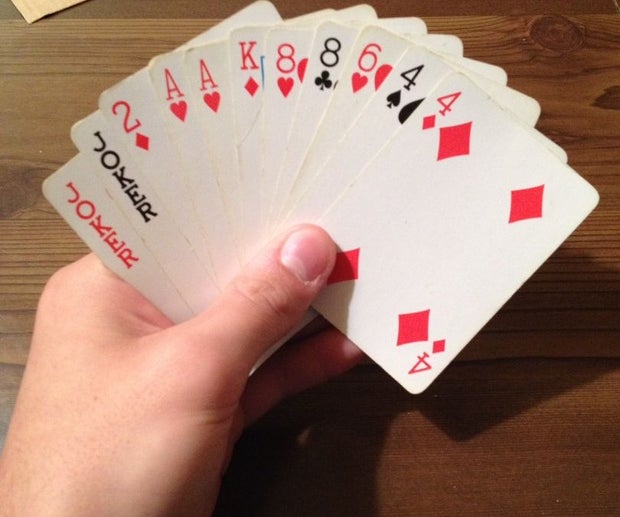
| German playing cards | Deuce (German: Daus) |
| French playing cards | Ace (German: Ass, French: as) |
Origin and history[edit]
The word Daus as a description of the two pips on a die has been in use since the 12th century.[3] It comes from the Late Old High German, later Middle High German word, dûs, which was borrowed from the North French word, daus. This corresponds to the French word for 'two', deux, which in turn came from the Latin duos and duo. On the introduction of playing cards into the German language area at the end of the 14th century, the word was also transferred to the cards with the value 2. This card became the highest value playing card in the German card deck, the equivalent of the Ace in the French deck.
On the German playing card with the 2, the deuce, there is often a picture of a hog or sow. While Friedrich Kluge is unsure,[4] how the card came to be called the Daus, because he avers that there are no game rules that have survived from the Middle Ages, Marianne Rumpf is clear: The word 'Daus' is a term that has been taken over from the dice game.[5] However, unlike dice games, in which the 2 was a low throw and did not count for much, the deuce card played a special role as a trick card, because it could even beat the King. The Early New High German author, Johann Fischart, says thus: 'I have thrown out the Ace, Sow and Deuce of Bells, Clubs, Hearts respectively; but now I hold the Sow of Acorns which now reigns'.[6] The name Schwein ('hog') was also used for the deuce as may be read in the Reimchronik über Herzog Ulrich von Württemberg ('Rhyming Chronicle About Duke Ulrich of Wurttemberg'), which also reveals that the Deuce, like the Ace in the modern game of Skat, was worth 11 points: 'The King ought to beat all the cards. That is apart from the Hog. It wants then to be worth 11.'[7]
Early evidence of the depiction of a hog on the card is found as early as the 15th century, from which Deuces of Bells and Acorns have survived on which there is a wild boar. Decks with a hog or sow on the card along with the 2 of Bells have also survived from the year 1525 in the Swiss National Museum in Zürich and in a deck dating to 1573 made by the Viennese artist, Hans Forster. There is also a deck of cards by a Frankfurt manufacturer dating to 1573, on which the hog is found on a 2 of Hearts.[5] The link between the Deuce and the Sow is evinced by Johann Leonhard Frisch in his 1741 German-Latin dictionary: 'Sow in card game, from the figure of a sow, which is painted on the Deuce of Acorns, whence the other deuces are also called Sows.'[8]
How the boar ended up on the playing card is unknown. Hellmut Rosenfeld suspects that it was derived from the prize sow that played a role in local shooting festivals (Schützenfesten) and which was linked with the last sheaf of the harvest.[9] The description Sau may have been a corruption of the word Daus, and the depiction of a boar on the playing cards was simply a pictorial illustration of this etymological development.
According to Marianne Rumpf, the name comes from a Baden dialect in which the 'S' is spoken like a 'Sch' and the word Dausch is used for a female pig or sow.[10]
[One] can ... with a little imagination, picture that the players, in the excitement of the game when playing the trump card ... loudly emphasize their triumph by saying the name of the card.[5]
The Brothers Grimm state in their dictionary,[11] that the word Tausch ('Swap') was used for the four cards. Perhaps the word Dausch inspired card artists who illustrated the free space under the coloured symbols with a sow.[5]
The language of card players may also have given rise to the expression Däuser (also Deuser) for 'coins', recorded since the 19th century, because in a game played for money, the aces are worth cash. Quite similar is the saying Däuser bauen Häuser ('deuces build houses'), which has been used since 1850, because with a trick with several aces, one quickly scores the points needed to win.[12]
See also[edit]
References[edit]
- ^ abGames played with German suited cards at www.pagat.com. Retrieved 26 May 2018.
- ^Lutz Röhrich: Lexikon der sprichwörtlichen Redensarten, 5 volume, Freiburg i. Br. 1991; Lemma Daus in Vol. 1, p. 309
- ^Belege für die Verwendung in mittelhochdeutscher Sprache im Wörterbuch der Grimms
- ^Friedrich Kluge: Etymologisches Wörterbuch der deutschen Sprache, revised by Elmar Seebold, 23rd edn. Berlin, New York, 1995; Lemmata 'Daus1' and 'Daus2', p. 164
- ^ abcdMarianne Rumpf: Zur Entwicklung der Spielkartenfarben in der Schweiz, in Deutschland und in Frankreich. In: 'Schweizerisches Archiv für Volkskunde' 72, 1976, pp. 1–32, doi:10.5169/seals-117151.
- ^Johann Fischart: Die wunderlichst vnerhörtest Legend vnd Beschreibung des … Hütleins …, 1591, in: Das Kloster, ed. by J. Scheible, Vol.10, 2: Fischarts kleinere Schriften, Stuttgart und Leipzig 1848, p.920; here quoted by Marianne Rumpf, p. 14
- ^Reimchronik über Herzog Ulrich von Württemberg und seiner nächsten Nachfolger, ed. by Eduard Frh. von Seckendorf, Stuttgart, 1863, p. 72; here quoted by Marianne Rumpf, p. 13
- ^Johann Leonhard Frisch: Teutsch-lateinisches Wörterbuch, Berlin, 1741, Vol. 2, p. 151; here quoted by Marianne Rumpf, p. 12
- ^Hellmut Rosenfeld: Münchner Spielkarten um 1500, Bielefeld, 1958, p. 11; paraphrased by Marianne Rumpf, p. 13
- ^Daus: Dausch in the Dictionary of the Brothers Grimm.
- ^Tausch in the Dictionary of the Brothers Grimm
- ^Heinz Küpper: Wörterbuch der deutschen Umgangssprache. 1st edition, 6th reprint, Stuttgart, Munich, Dusseldorf, Leipzig, 1997, keyword 'Daus', p. 160
Literature[edit]
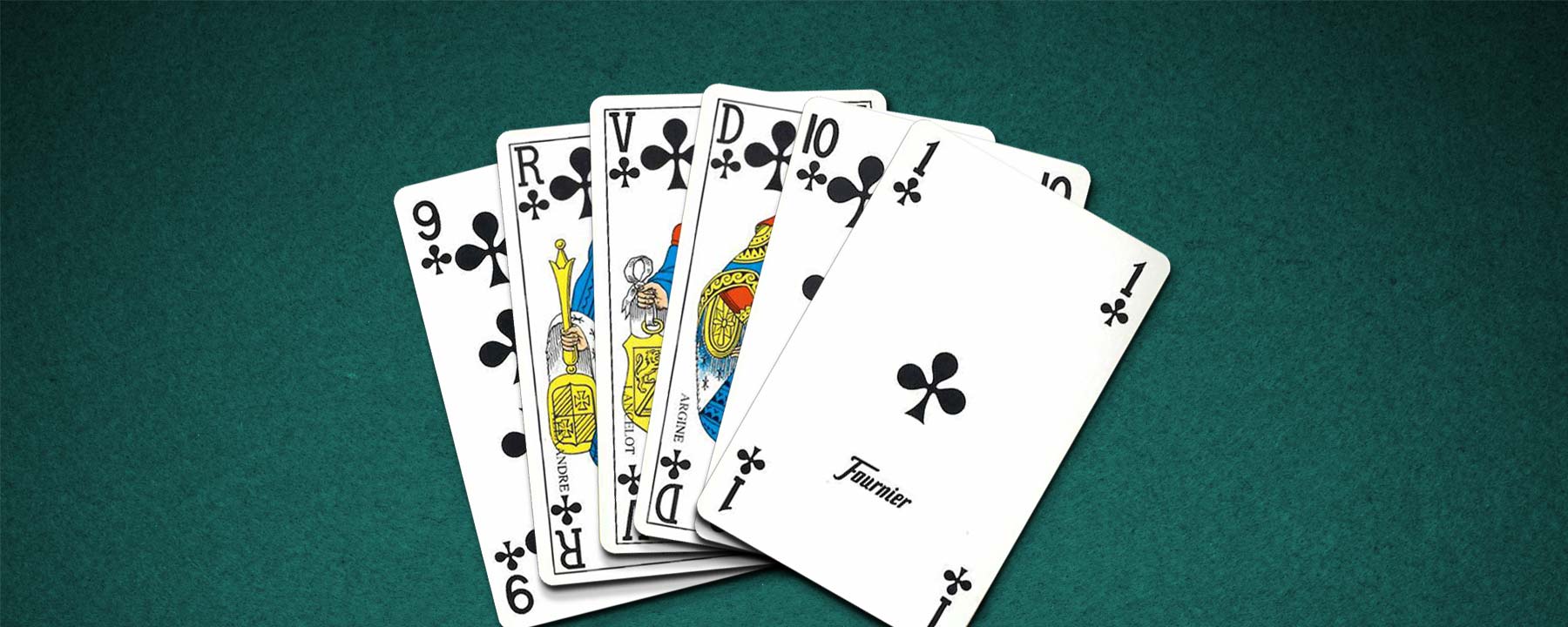
- Marianne Rumpf: Zur Entwicklung der playing cardsnfarben in der Schweiz, in Deutschland und in Frankreich. In: „Schweizerisches Archiv für Volkskunde“ 72, 1976, pp. 1–32 (for Daus, see pp. 11–14)
External links[edit]
- Media related to Deuces (playing cards) at Wikimedia Commons
| Pay Table | ||
| Natural Royal Flush pays 250X | Four of a Kind pays 5X | |
| Four Deuces pays 200X | Full House pays 3X | |
| Five of a Kind pays 25X | Flush pays 2X | |
| Royal Flush (with Deuces) pays 15X | Straight pays 2X | |
| Straight Flush pays 9X | Three of a Kind pays 1X | |
- To CHANGE your bet before the draw, MAX out the bet, then click BET button 3 times. Bet will go to zero.
- If you go broke, just use your browser's RELOAD or REFRESH button or exit the game and then return.
Deuces Wild
Probably the most common of all poker variations played online today is Deuces Wild. This draw poker game uses the normal 52 card pack, but each of the four 'two point' cards or 'deuces' may represent any card chosen by the player who holds them in their hand. This variation provides players with a greater chance of making a winning hand, and payout rates are adjusted accordingly.
The card game of poker has more variations than any other card game played today. The transfer from traditional card game to online poker play has seen a remarkable explosion of interest in all variations of the game, and new online poker websites appear on internet websites on a regular basis.
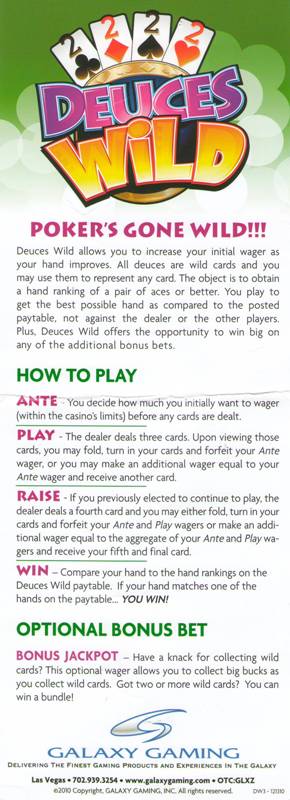
Rule playing follows standard draw poker hand rankings, but normally a minimum hand for winning will be two pairs, or one pair of king or aces. Following the initial ante bet, each player is dealt five cards face down. Players examine their hand and select a specific number of cards to exchange. Certain house rules may set a maximum number of cards that can be replaced, although many games will permit players to replace all five cards in their hands. Once the draw is complete, players will show their hands, and payout is made according to a pre-defined schedule. Players lucky enough to hold deuces will use these as wild cards, thus greatly increasing their chances of beating the 'house'.
Rules Of Deuces Card Game
In addition to the standard payout, Deuces Wild poker players may also be able to gamble on a winning hand and double their payout. This is normally achieved by the dealer taking one card face up, and dealing four more face down from which the player selects one card. If the player's card is higher than the dealer's, then a double payout is made to the player. If the dealer's card is higher than the player's then the player forfeits their win. Players have a third option of gambling half of their win, and attempting to double up on the other half. If they lose out on the double, they still keep half of their initial winnings.
Interested in playing slots online against other players around the world? Start with a Crazy Slots game.
Free Deuces Wild Casino Game
Also Try out our multi-deck Jacks or Better.